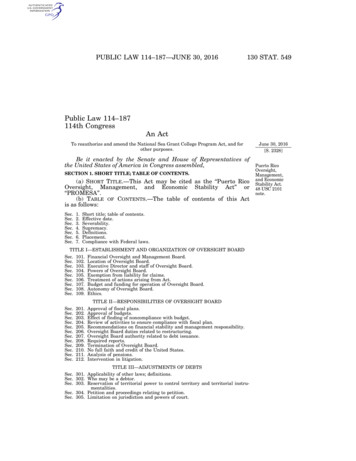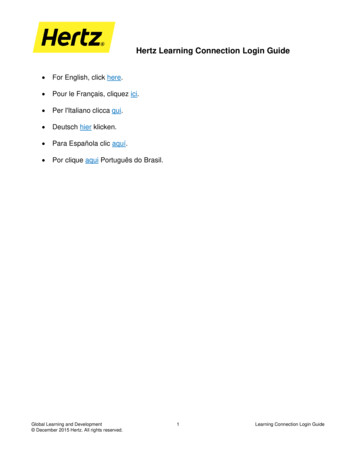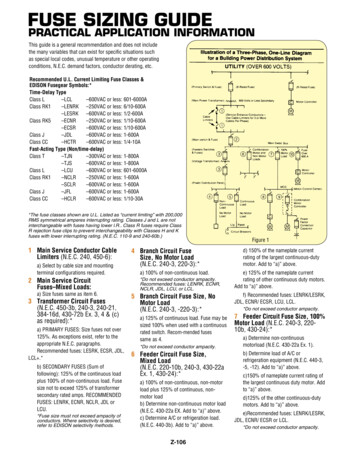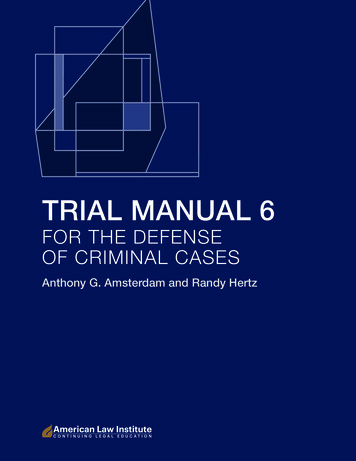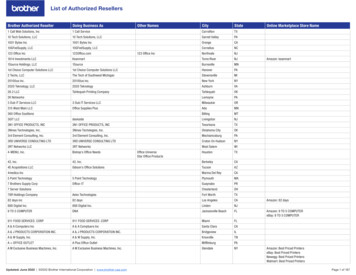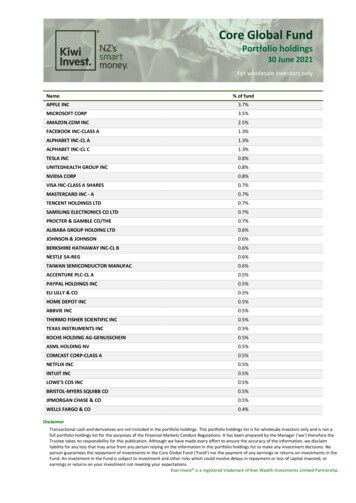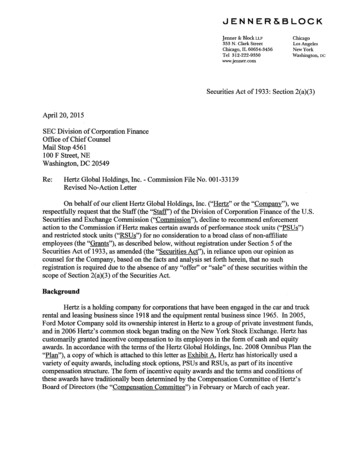
Transcription
ENNER&BLOCKJenner & Block LLP353 N. Clark StreetChicago, IL 60654-3456Tel 312-222-9350wwwjenner.comChicagoLos AngelesNew YorkWashington, DCSecurities Act of 1933: Section 2(a)(3)April20, 2015SEC Division of Corporation FinanceOffice of Chief CounselMail Stop 4561100 F Street, NEWashington, DC 20549Re:Hertz Global Holdings, Inc.- Commission File No. 001-33139Revised No-Action LetterOn behalf of our client Hertz Global Holdings, Inc. ("Hertz" or the "Company"), werespectfully request that the Staff (the "Staff') of the Division of Corporation Finance of the U.S.Securities and Exchange Commission ("Commission"), decline to recommend enforcementaction to the Commission ifHertz makes certain awards of performance stock units ("PSUs")and restricted stock units ("RSUs") for no consideration to a broad class of non-affiliateemployees (the "Grants"), as described below, without registration under Section 5 oftheSecurities Act of 1933, as amended (the "Securities Act"), in reliance upon our opinion ascounsel for the Company, based on the facts and analysis set forth herein, that no suchregistration is required due to the absence of any "offer" or "sale" of these securities within thescope of Section 2(a)(3) of the Securities Act.BackgroundHertz is a holding company for corporations that have been engaged in the car and truckrental and leasing business since 1918 and the equipment rental business since 1965. In 2005,Ford Motor Company sold its ownership interest in Hertz to a group of private investment funds,and in 2006 Hertz's common stock began trading on the New York Stock Exchange. Hertz hascustomarily granted incentive compensation to its employees in the form of cash and equityawards. In accordance with the terms of the Hertz Global Holdings, Inc. 2008 Omnibus Plan the"Plan"), a copy of which is attached to this letter as Exhibit A, Hertz has historically used avariety of equity awards, including stock options, PSUs and RSUs, as part of its incentivecompensation structure. The form of incentive equity awards and the terms and conditions ofthese awards have traditionally been determined by the Compensation Committee of Hertz'sBoard of Directors (the "Compensation Committee") in February or March of each year.
On May 13, 2014, Hertz delayed the filing of its Form 10-Q for the period ended March31, 2014 (the "First Quarter 10-Q"). During the preparation of the First Quarter 10-Q, errorswere identified relating to Hertz's conclusions regarding the capitalization and timing ofdepreciation for certain non-fleet assets, allowances for doubtful accounts in Brazil, as well asother items. Hertz continued its review and identified additional errors related to allowances foruncollectible amounts with respect to renter obligations for damaged vehicles and restorationobligations at the end of facility leases. Following the identification of these errors, the AuditCommittee of Hertz's Board of Directors (the "Audit Committee") consulted with managementand analyzed the adjustments and, on June 3, 2014, concluded that Hertz's financial statementsfor 2011 should no longer be relied upon, and Hertz must restate them. The Audit Committeedirected Hertz's management to conduct a thorough review of the financial records for fiscalyears 2011, 2012 and 2013 to determine whether further adjustments were necessary. OnNovember 10, 2014, the Audit Committee, in consultation with management, concluded thatadditional proposed adjustments arising out of the review are material to the Company's 2012and 2013 financial statements and that, as a result, the 2012 and 2013 annual and quarterlyfinancial statements must also be restated. The Company disclosed at that time that Hertz doesnot expect to complete the review process and file updated financial statements before mid-2015.As a result of this ongoing review, Hertz has been unable to timely file its Forms 10-Q for thethree months ended March 31, June 30 and September 30, 2014 as required pursuant to theSecurities Exchange Act of 1934, as amended (the "Exchange Act").In light of the ongoing financial statement review, the Company has determined that,because the Company was not current in its reporting obligations at the time that its Form S-8registration statement was required to be updated under Section 10(a)(3), the Company is notpresently eligible to use Form S-8. The Company will not be eligible to use Form S-8, or anyother form of registration statement, until such time as the Company completes the financialstatement review and becomes current in its reporting obligations.Impact of the Financial Statement Review on Hertz's Compensation ProgramAs noted above, Hertz utilizes both cash and equity awards for its incentive compensationprograms. Hertz believes that this approach provides an appropriate mix of short and long-termincentives. The inability to grant equity awards to non-affiliate employees during the ongoingfinancial statement review could have a negative impact on Hertz's ability to retain and providecompetitive incentive compensation to employees. The Company does not believe that the useof spot cash awards or bonuses when the Company is not current in its Exchange Act reportingobligations meets the overall objectives of Hertz's compensation programs in an optimal mannerbecause the cash awards would be decoupled from Hertz's financial and operating performanceand would not sufficiently aid in long-term retention. Hertz believes that equity awards,particularly performance-vesting equity awards such as PSUs and time-vesting equity awardssuch as the RSUs, when used in conjunction with cash and other compensation plans, represent asuperior method to motivate and retain employees in comparison to cash or other compensationprograms alone.To address these concerns, the Company proposes to make Grants to non-affiliateemployees in accordance with the terms outlined below. Until such time as the Company is once2
again eligible to use Form S-8, any equity grants made by the Company to employees notsatisfying the requirements outlined in this letter, including any affiliates of the Company, wouldbe made only pursuant to an available exemption from the registration requirements of theSecurities Act and we are not seeking guidance from the Staff with respect to such equity grants.The Material Features of the Equity Compensation ProgramThe Company is proposing to make the Grants to a broad class of U.S. and non-U.S.employees, none of whom will be an "affiliate" of the Company within the meaning of Rule 405under the Securities Act. The Grants would be made under the Plan, solely for compensatorypurposes as part of the Company's annual equity incentive award cycle. The Grants will cover amaximum of 800,000 shares common stock, representing approximately 0.2% of the Company'soutstanding common stock.The type and amount of the Grants would be made consistent with past practice, based oncriteria which take into account the recipient's responsibility within the Company, position, pastperformance and salary. Recipients would not be required to surrender any cash, securities orother items of value as a condition to receipt or vesting of the Grants (except as required tocomply with applicable tax withholding requirements), nor will they be required to enter into anyagreement or covenant, other than a customary award agreement which does not contain anycovenants other than with respect to compliance with applicable securities and tax laws andregulations and the terms of the award itself.The Grants will consist of performance-vesting equity awards consisting ofPSUs andtime-vesting equity awards consisting ofRSUs, with recipients of each type of award to bedetermined by the Compensation Committee. The PSU s will be earned based on achievement ofannual Corporate EBITDA results for 2015, 2016 and 2017 against the Company's 2015Corporate EBITDA target, with one-third of the PSUs being eligible to be earned based on theCompany's performance as compared to the 2015 Corporate EBITDA target with respect to eachrespective year. The total number ofPSUs earned will be the sum of the amounts earned withrespect to each of2015, 2016 and 2017, with the vesting of the PSUs subject to continuedemployment requirements specified in the applicable award agreement. A copy of the proposedform ofPSU award agreement is attached to this letter as Exhibit B. The RSUs will vest noearlier than the first anniversary of the grant date, subject to continued employment requirementsspecified in the applicable award agreement, with the specific vesting schedule to be determinedby the Compensation Committee. A copy of the proposed form of RSU award agreement isattached to this letter as Exhibit C. Subject to the following paragraph, upon vesting, each RSUand earned PSU will be settled by the delivery of one share of Hertz common stock.Under the award agreements, the Company will not deliver shares in respect of vestedawards prior to such time as the Company is current with its Exchange Act reporting obligations.The award agreements will also provide that the unvested portion of the Grant will generally beforfeited upon termination of employment. In addition, because the Company will treat all sharesissued upon the vesting ofPSUs and RSUs on a "no-sale" basis as "restricted securities" withinthe meaning of Rule 144 under the Securities Act, recipients must also agree as a condition to the3
award that no such shares may be sold until the Company has an effective Securities Actregistration statement relating to the underlying shares.Analysis-No "Offer" or "Sale" Under Equity Compensation ProgramAs counsel to Hertz, based on the facts and analysis set forth herein, it is our legalopinion that the proposed Grants to non-affiliate employees described above do not requireregistration under the Securities Act because of the absence of an "offer" or "sale" for purposesof Section 2(a)(3) of the Securities Act.The Securities Act provides that every offer or sale of a security made through the use ofthe mails or interstate commerce must be either registered under the Securities Act or exemptfrom such registration. The Commission has previously indicated that stock awarded at no directcost to "a relatively broad class of employees" does not constitute a "sale" for purposes ofSection 2(a)(3) of the Securities Act, as the employees "do not individually bargain to contributecash or other tangible or definable consideration to such plans." 1 As indicated in the 1980Release, "[t]he basis for this position generally has been that there is no 'sale' in the SecuritiesAct sense to employees, since such persons do not individually bargain to contribute cash orother tangible or definable consideration to such plans."2 The Grants, which will be broad-based,involuntary and non-contributory, will be issued under the Plan and, as with grants made inprevious years, are intended to form incentive compensation to the applicable employee. Theaward recipients will not provide separate "value" for the Grants and will not individuallynegotiate or bargain to contribute cash or other definable consideration in connection with theGrants made pursuant to the Plan. Accordingly, the Grants will not constitute a "sale" ofsecurities or an "offer to sell" securities as such terms are defined in Section 2(a)(3) of theSecurities Act and, therefore, do not require registration under Section 5 of the Securities Act. Asfurther indicated in the 1980 Release, one ofthe principles underlying the Staffs position is thatregistration of bonus stock would "serve little purpose . since employees in almost all instanceswould decide to participate if given the opportunity."3 The Company has no reason to believethat any of its employees would refuse to participate in the Grants contemplated herein.On several occasions, the Staff has confirmed its decision not to recommend enforcementaction in situations where employer-issuers have made awards of various forms of equity-basedcompensation to their employees, without compliance with the registration provisions of theSecurities Act, based upon the theory that such awards are not a "sale" within the meaning ofSection 2(a)(3) of the Securities Act. 4In Verint, the Staff did not object to Verint's proposed award of restricted stock units toits employees on a "no sale" basis while Verint was not current in its Exchange Act reportingobligations due to Verint's ongoing investigation and review of its financial statements forprevious years. We agree with the position taken by Verint' s counsel in the letter that the1See SEC Rei. No. 33-6188 (Feb. 1, 1980 (the "1980 Release")), at Section II.A.5.d.Id.3Id.4See Verint Systems Inc. (May 24, 2007); Goldman Sachs Group, L.P. (August 24, 1998).24
appropriate focus of the "no-sale" analysis should be on whether the employee is making aninvestment decision with respect to the Grants. As indicated above, the Company is awarding theGrants to a broad group of non-affiliate employees for compensatory purposes and is notrequiring any employee to surrender cash, securities or other property in exchange for the Grants(except as required to comply with applicable tax withholding requirements), nor is the Companyrequiring any such employee to enter into any agreement or covenant in exchange for the Grants,other than a customary award agreement which would not contain any covenants other than withrespect to compliance with applicable securities and tax laws and regulations and the terms of theaward itself. The Grants are not being awarded to any employee as a result of an employmentagreement or any other written or unwritten employment arrangement. The Company has madeequity awards in the past to substantially the same pool of non-affiliate employees. As a result,no employee is making an investment decision in receiving the Grants. We do not believe thisconclusion is altered by the presence of customary vesting and forfeiture provisions in the awardagreements tied to continued employment with the Company and, in the case ofPSUs,achievement ofEBITDA targets.As in the case of the grants addressed in similar no-action letters, and in accordance withthe 1980 Release, the Grants will be non-contributory and will be offered to non-affiliateemployees who do not individually negotiate or bargain to contribute cash or other definableconsideration in exchange for the Grants. 5 A recipient of the Grants will not make an investmentdecision with respect to receipt of the Grants, will not provide any value to the Company inreturn, and will have no control over vesting (other than a decision by a recipient to terminate hisor her employment with Hertz before the applicable vesting date). Thus, the Grants will not be aSection 5 event of sale. The Staffs interpretive and no-action letters in this area make clear thatan employee's continued service throughout a prescribed vesting period before he or she canrealize the economic benefits of a particular award does not constitute a surrender of value to theemployer that would transform such broad-based awards into "sales" of the securities underlyingthe awards within the scope of Section 2(a)(3) ofthe Securities Act. 6ConclusionFor the foregoing reasons, we respectfully request that the Staff confirm that it will notrecommend enforcement action to the Commission if the Company makes the Grants describedherein without registration in reliance on olir opinion as counsel based on the facts and analysisset forth herein that the Grants do not involve a "sale" or "offer to sell" for purposes of Section2(a)(3) of the Securities Act.56See footnote 84 to the 1980 Release.See Verint; UnionBanCal Corporation (Nov. 2010).5
If you have any additional questions or any require further information, please call theundersigned at 1-202-639-6038.Thank you for your attention to this matter.Sincerely, T ert, ' f·Jenner & Block LLP1099 New York A venue, NW Suite 900Washington, DC 20001-44126.
Exhibit AHertz Global Holdings, Inc. 2008 Omnibus PlanSee attached
HERTZ GLOBAL HOLDINGS, INC.2008 OMNIBUS INCENTIVE PLAN(as amended and restated effective as of March 4, 2010)ARTICLE IPURPOSESThe purposes of the Plan are to foster and promote the long-term financial success of theCompany and the Subsidiaries and materially increase shareholder value by (a) motivatingsuperior performance by Participants, (b) providing Participants with an ownership interest in theCompany, and (c) enabling the Company and the Subsidiaries to attract and retain the services ofoutstanding Employees upon whose judgment, interest and special effort the successful conductof its operations is largely dependent.ARTICLE IIDEFINITIONS2.1Certain Definitions. Capitalized terms used herein without definition shall havethe respective meanings set forth below:"Aqjustment Event" means any dividend payable in capital stock, stock split, sharecombination, extraordinary cash dividend, recapitalization, reorganization, merger,consolidation, split-up, spin-off, combination, exchange of shares or other similar event affectingthe Common Stock."Affiliate" means, with respect to any person, any other person controlled by, controllingor under common control with such person."Alternative Award'' has the meaning given in Section 9.2."Award'' means any Option, Stock Appreciation Right, Performance Stock, PerformanceStock Unit, Performance Unit, Restricted Stock, Restricted Stock Unit, Share Award or DeferredStock Unit granted pursuant to the Plan, incl ding an Award combining two or more types in asingle grant."Award Agreement" means any written agreement, contract, or other instrument ordocument evidencing any Award granted by the Committee pursuant to the Plan. The terms ofany plan or guideline adopted by the Committee and applicable to an Award shall be deemedincorporated in and part of the related Award Agreement. The Committee may provide for theuse of electronic, internet or other non-paper Award Agreements, and the use of electronic,1
internet or other non-paper means for the Participant's acceptance of, or actions under, an AwardAgreement unless otherwise expressly specified herein. In the event of any inconsistency orconflict between the terms of the Plan and an Award Agreement, the terms of the Plan shallgovern."Business" has the meaning given in Section 5.5."Board'' means the Board of Directors of the Company."Carlyle Investors" means, collectively, (i) Carlyle Partners IV, L.P., (ii) CEP IIParticipations S.ar.l., (iii) CP IV Co-investment, L.P., and (iv) CEP II U.S. Investments, L.P."Cause" means, except as otherwise defined in an Award Agreement, with respect to anyParticipant (as determined by the Committee) (i) willful and continued failure to performsubstantially the Participant's material duties with the Company (other than any such failureresulting from the Participant's incapacity as a result of physical or mental illness) after a writtendemand for substantial performance specifying the manner in which the Participant has notperformed such duties is delivered to the Participant by the person or entity that supervises ormanages the Participant, (ii) engaging in willful and serious misconduct that is injurious to theCompany or any of its Subsidiaries, (iii) one or more acts of fraud or personal dishonestyresulting in or intended to result in personal enrichment at the expense of the Company or any ofits Subsidiaries, (iv) substantial abusive use of alcohol, drugs or similar substances that, in thesole judgment of the Company, impairs the Participant's job performance, (v) material violationof any Company policy that results in harm to the Company or any of its Subsidiaries or (vi)indictment for or conviction of (or plea of guilty or nolo contendere) to a felony or of any crime(whether or not a felony) involving moral turpitude. A "Termination for Cause," shall include adetermination by the Committee following a Participant's termination of employment for anyother reason that, prior to such termination of employment, circumstances constituting Causeexisted with respect to such Participant."CDR Investors" means, collectively, (i) Clayton, Dubilier & Rice Fund VII, L.P., (ii)CDR CCMG Co-Investor L.P., and (iii) CD&R Parallel Fund VII, L.P."Change in Control" means the first occurrence of any of the following events after theeffective date ofthe Plan:(a)the acquisition by any person, entity or "group" (as defined in Section 13(d) of theExchange Act), other than the Company, the Subsidiaries, any employee benefit plan of theCompany or the Subsidiaries, or any of the Investors, of 50% or more of the combined votingpower of the Company's then outstanding voting securities;(b)within any 24-month period, the Incumbent Directors shall cease to constitute atleast a majority of the Board or the board of directors of any successor to the Company; providedthat any director elected to the Board, or nominated for election, by a majority of the Incumbent2
Directors then still in office shall be deemed to be an Incumbent Director for purposes of thisclause (b);(c)the merger or consolidation of the Company as a result of which persons whowere owners of the voting securities of the Company, immediately prior to such merger orconsolidation, or any or all of the Investors, do not, immediately thereafter, own, directly orindirectly, more than 50% of the combined voting power entitled to vote generally in the electionof directors of the merged or consolidated company.(d)the approval by the Company's shareholders of the liquidation or dissolution ofthe Company other than a liquidation of the Company into any Subsidiary or a liquidation aresult of which persons who were stockholders of the Company immediately prior to suchliquidation, or any or all of the Investors, own, directly or indirectly, more than 50% of thecombined voting power entitled to vote generally in the election of directors of the entity thatholds substantially all of the assets of the Company following such event; and(e)the sale, transfer or other disposition of all or substantially all of the assets of theCompany to one or more persons or entities that are not, immediately prior to such sale, transferor other disposition, Affiliates of the Company.Notwithstanding the foregoing, a "Change in Control" shall not be deemed to occur if theCompany files for bankruptcy, liquidation or reorganization under the United States BankruptcyCode."Change in Control Price" means the price per share on a fully diluted basis offered inconjunction with any transaction resulting in a Change in Control, as determined in good faith bythe Committee as constituted before the Change in Control, if any part of the offered price ispayable other than in cash."Code" means the Internal Revenue Code of 1986, as amended, and the regulationspromulgated thereunder."Committee" means the Compensation Committee of the Board or, if applicable, thedelegate of the Compensation Committee of the Board as permitted or required herein."Common Stock" means the common stock, par value 0.01 per share, of the Companyand any other securities into which the Common Stock is changed or for which the CommonStock is exchanged."Company" means Hertz Global Holdings, Inc., a Delaware corporation, and anysuccessor thereto."Covered Period" has the meaning given in Section 5.5."Deforred Annual Amount" has the meaning given in Section 8.1.3
"Deferred Stock Unit" means a Participant's contractual right to receive a stated numberof shares of Common Stock or, if provided by the Committee on or after the grant date, cashequal to the Fair Market Value of such shares of Common Stock or any combination of shares ofCommon Stock and cash having an aggregate Fair Market Value equal to such stated number ofshares of Common Stock, under the Plan at the end of a specified period of time."Disability" means, unless otherwise provided .in an Award Agreement, a physical ormental disability or infirmity that prevents or is reasonably expected to prevent the performanceof a Participant's employment-related duties for a period of six months or longer and, within 30days after the Company notifies the Participant in writing that it intends to terminate hisemployment, the Participant shall not have returned to the performance of his employment related duties on a full-time basis; provided, that (i) for purposes of Section 5.3(a) in respect ofISOs, the term "Disability" shall have the meaning assigned to the term "Permanent and TotalDisability" by section 22(e)(3) of the Code (i.e., physical or mental disability or infirmity lastingnot less than 12 months), and (ii) with respect to any Award that constitutes deferredcompensation subject to section 409A of the Code, "Disability" shall have the meaning set forthin section 409A(a)(2)(c) of the Code. The Committee's reasoned and good faith judgment ofDisability shall be final, binding and conclusive, and shall be based on such competent medicalevidence as shall be presented to it by such Participant and/or by any physician or group ofphysicians or other competent medical expert employed by the Participant or the Company toadvise the Committee. Notwithstanding the foregoing (but except in the case of ISOs andawards subject to section 409A of the Code), with respect to any Participant who is a party to anemployment agreement with the Company or any Subsidiary, "Disability" shall have themeaning, if any, specified in such Participant's employment agreement."Dividend Equivalents" means an amount equal to any dividends and distributions paidby the Company with respect to the number of shares of Common Stock subject to an Award."Employee" means any non-employee director, officer or employee of, or any naturalperson who is a consultant to, the Company or any Subsidiary."Exchange Act" means the Securities Exchange Act of 1934, as amended, and the rulespromulgated thereunder."Executive Officer" means each person who is an officer of the Company or anySubsidiary and who is subject to the reporting requirements under Section 16(a) of the ExchangeAct."Fair Market Value" means, unless otherwise defined in an Award Agreement, as of anydate, the closing price of one share of Common Stock on the New York Stock Exchange (or onsuch other recognized market or quotation system on which the trading prices of Common Stockare traded or quoted at the relevant time) on the date as of which such Fair Market Value isdetermined. If there are no Common Stock transactions reported on the New York StockExchange (or on such other exchange or system as described above) on such date, Fair Market4
Value shall mean the closing price for a share of Common Stock on the immediately precedingday on which Common Stock transactions were so reported."Incumbent Director" means, with respect to any period of time specified under the Planfor purposes of determining a Change in Control, the persons who were members of the Board atthe beginning of such period; provided, that a director elected, or nominated for election, to theBoard in connection with a proxy contest shall not be considered an Incumbent Director."Initial Investors" means, collectively, the Carlyle Investors, the CDR Investors and theMerrill Lynch Investors."Investors" means, collectively, (i) the Initial Investors, (ii) TC Group L.L.C. (whichoperates under the trade name The Carlyle Group), (iii) Clayton, Dubilier & Rice, Inc., (iv)Merrill Lynch Global Partners, Inc., (v) any Affiliate of any of the foregoing, including anyinvestment fund or vehicle managed, sponsored or advised by any of the foregoing, and (vi) anysuccessor in interest to any of the foregoing."ISOs" has the meaning given in Section 5.1(a)."Merrill Lynch Investors" means, collectively, (i) ML Global Private Equity Fund, L.P.,(ii) Merrill Lynch Ventures L.P. 2001, (iii) CMC-Hertz Partners, L.P., and (iv) ML Hertz Co Investor, L.P."New Employer" means a Participant's employer, or the parent or a subsidiary of suchemployer, immediately following a Change in Control."NSOs" has the meaning given in Section 5.1(a)."Option" means the right granted to a Participant pursuant to the Plan to purchase a statednumber of shares of Common Stock at a stated price for a specified period of time."Option/SAR Financial Gain" has the meaning given in Section 5.5."Participant" means any Employee or prospective Employee designated by theCommittee to receive an Award under the Plan."Performance Period' means the period, as determined by the Committee, during whichthe performance of the Company, any Subsidiary, any business unit and any individual ismeasured to determine whether and the extent to which the applicable performance measureshave been achieved, provided that each such period shall be no greater than five years in length."Performance Stock" means a grant of a stated number of shares of Common Stock to aParticipant under the Plan that is forfeitable by the Participant until the attainment of specifiedperformance goals, or until otherwise determined by the Committee or in accordance with thePlan, subject to the continuous employment of the Participant through the completion of the5
applicable Performance Period (or such portion of the applicable Performance Period asotherwise provided in Article VI)."Performance Stock Unit" means a Participant's contractual right to receive a statednumber of shares of Common Stock or, if provided by the Committee on or after the grant date,cash equal to the Fair Market Value of such shares of Common Stock or any combination ofshares of Common Stock and cash having an aggregate Fair Market Value equal to such statednumber of shares of Common Stock, under the Plan at a specified time that is forfeitable by theParticipant until the attainment of specified performance goals, or until otherwise determined bythe Committee or in accordance with the Plan, subject to the continuous employment of theParticipan
Hertz is a holding company for corporations that have been engaged in the car and truck rental and leasing business since 1918 and the equipment rental business since 1965. In 2005, Ford Motor Company sold its ownership interest in Hertz to a group ofprivate investment funds,




